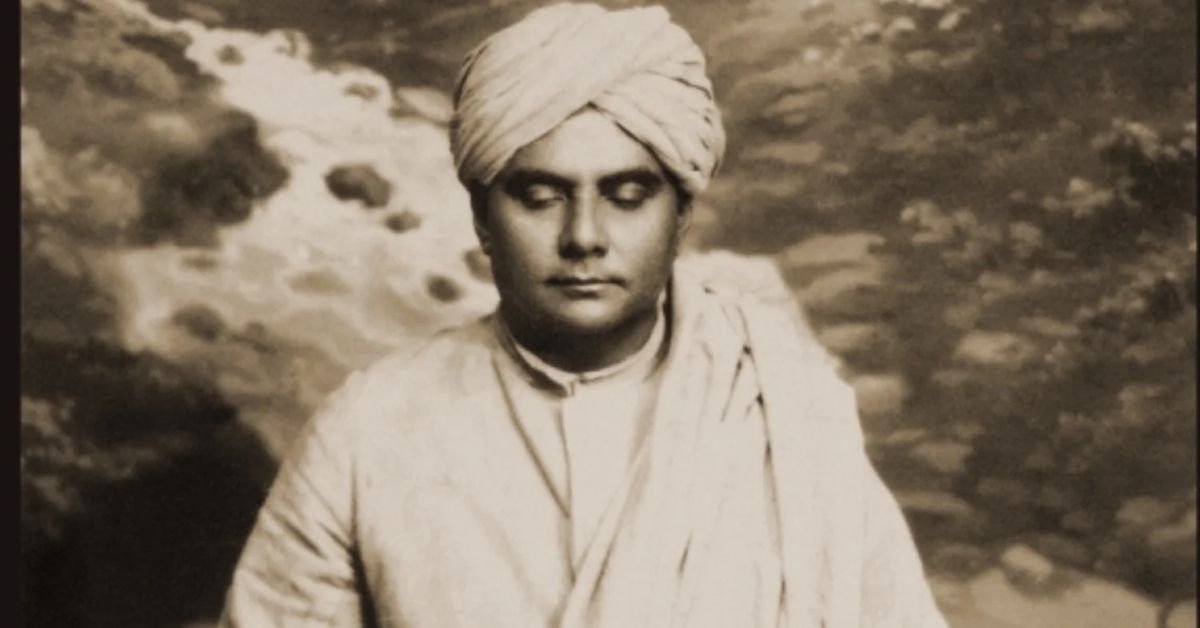Table Of Contents
Introduction: A Beacon of Wisdom for Modern Seekers
Hey there, friend!
Have you ever wondered about life’s deeper meaning, why we are here, how to find peace, or what lies beyond this world?
If so, you are in for a treat.
Today, we are diving into the teachings of Swami Abhedananda, a spiritual luminary whose insights feel as fresh today as they did a century ago.
As part of THOUSIF Inc. – WORLDWIDE, we are thrilled to share his wisdom in a clear, relatable way packed with practical value for everyday life.
Swami Abhedananda, born Kaliprasad Chandra in 1866 in Kolkata, was no ordinary teacher.
As a devoted disciple of the mystic Sri Ramakrishna, he soaked up profound spiritual truths early in life.
Nicknamed “Kali Tapaswi” for his intense meditative practices, he wandered India’s sacred sites, from the Himalayas to the Ganges, learning from sages and scriptures.
In 1897, he took his mentor Swami Vivekananda’s advice and sailed to the West, where he spent over 25 years spreading Vedanta philosophy.
From New York’s Vedanta Society to lecture halls across America and Europe, he made ancient wisdom accessible to all.
Later, he returned to India, founding spiritual centers in Kolkata and Darjeeling and even exploring Buddhist teachings in Tibet.
When he passed in 1939, he left a treasure trove of books and ideas that still inspire millions.
What makes Abhedananda special?
His teachings, rooted in Vedanta, focus on unity, self-discovery, and practical spirituality.
He had a knack for explaining complex ideas, like reincarnation or karma, in ways anyone could grasp, whether you are a curious beginner or a seasoned seeker.
Trivia Tidbit: Did you know Swami Abhedananda claimed to have uncovered ancient texts in Tibet suggesting Jesus spent time in India during his “lost years”? This bold idea stirred global debates and highlighted his passion for connecting Eastern and Western spiritual traditions.
Let us dive into these 10 teachings, each a gem for living with purpose and peace.
1. The Unity Of All Existence: Embracing Oneness
At the heart of Swami Abhedananda’s philosophy is Advaita Vedanta, or non-dualism, which teaches that everything, your soul, my soul, the universe, is part of one divine reality, often called Brahman.
Think of it like a giant ocean: each of us is a wave, unique but inseparable from the whole.
Abhedananda said, “The sense of separateness is the root of all misery.” Realizing this unity brings peace and dissolves conflict.
Why It Matters
Feeling isolated or at odds with others is easy in our fast-paced, divided world.
Abhedananda’s teaching reminds us we are connected, nature and even the cosmos.
This perspective shifts how you see challenges, from workplace stress to global issues like climate change.
If we are all one, harming others or the planet is like harming ourselves.
How To Apply It
- Daily Reflection: Start your day with a 5-minute meditation. Close your eyes, breathe deeply, and visualize yourself as part of a vast, loving universe. We do this when we feel overwhelmed, like hitting a reset button.
- Compassion Practice: Next time you are frustrated with someone, pause and think, “They are part of the same divine spark as me.” It is incredible how this softens your heart.
- Journal Prompt: Write about a moment when you felt deeply connected to a person, nature, or something bigger. How can you recreate that feeling?
Abhedananda’s time in the West showed him how people craved unity amidst cultural divides.
He often shared stories of universal love, like how a kind act ripples outward.
For example, helping a neighbor is lovely; it strengthens the web of oneness.
In 2025, with social media amplifying differences, this teaching feels like a balm, encouraging us to build bridges.
2. Reincarnation: The Soul’s Journey Of Growth
Abhedananda had a gift for making reincarnation feel logical, not mystical.
He taught that the soul takes on multiple lives to learn, grow, and ultimately realize its divine nature.
It is like a student progressing through grades, each life offering new lessons based on past actions (karma).
Why It Matters
Ever wonder why some people seem born with talents or face unique challenges?
Abhedananda explained that our current lives reflect impressions (samskaras) carried from past lives.
This is not about punishment; it is about evolution.
Understanding this helps you see struggles as growth opportunities, not random bad luck.
How To Apply It
- Self-Inquiry: When facing a recurring issue, like anxiety or conflict, ask, “What is the lesson here?” We have found that journaling about patterns in our lives reveals insights, like why we avoid certain risks.
- Meditation for Insight: Abhedananda suggested meditating to glimpse past-life impressions. Sit quietly, focus on your breath, and invite clarity about your soul’s journey.
- Parenting Tip: Notice your child’s unique traits? They might reflect their soul’s past. Encourage their strengths with patience, knowing they are on their own path.
Abhedananda’s lectures in America compared reincarnation to scientific evolution, showing how souls progress spiritually.
He drew from the Upanishads and Buddhist texts, noting that many cultures embrace this idea.
In 2025, with growing interest in mindfulness, his approach feels modern, encouraging us to live intentionally, knowing our actions shape future lives.
3. The Law of Karma: You Reap What You Sow
To Abhedananda, karma was the law of cause and effect governing our actions.
Every thought, word, and deed plants a seed that bears fruit in this life or the next.
However, it is not fate; you have the power to shape your destiny through mindful choices.
Why It Matters
Karma explains life’s ups and downs without blame.
It is empowering: You are not a victim but a co-creator of your path.
This teaching offers agency and hope in a world where we often feel helpless.
How To Apply It
- Mindful Actions: Before making a choice, ask, “What seed are we planting?” For example, speaking kindly in a tense meeting can defuse conflict and build positive karma.
- Karma Yoga: Abhedananda loved this practice, which involves working selflessly without obsessing over results. Try volunteering or doing a task with complete focus but no ego. It is surprisingly freeing.
- Forgiveness: Holding grudges ties you to negative karma. As we have learned, letting go feels like shedding a heavy backpack.
Abhedananda’s book, Doctrine of Karma, used examples like a farmer’s harvest to make this relatable.
His Western lectures resonated because they framed karma as universal justice, not punishment.
Today, with mental health awareness rising, karma encourages us to act intentionally, knowing our choices ripple outward.
4. Yoga: A Path To Inner Peace
Abhedananda saw yoga as a science, not just exercise.
Drawing from Patanjali’s Yoga Sutras, he taught that yoga unites body, mind, and soul through meditation, breath control, and ethical living.
Why It Matters
In our stressed-out world, yoga offers tools to find calm and clarity.
Abhedananda emphasized that it is not about fancy poses but mastering your mind to uncover your true self.
How To Apply It
- Breath Work: Feeling anxious? Try 4-7-8 breathing (inhale for 4, hold for 7, exhale for 8). We use this before big meetings, and it works wonders.
- Daily Practice: Dedicate 10 minutes to meditation or gentle stretches. Focus on one thought, like peace, to train your mind.
- Ethical Living: Yoga starts with non-violence and truthfulness. Practice small acts of honesty daily.
Abhedananda’s book How to Be a Yogi made yoga accessible to Westerners, blending it with universal values.
In 2025, with yoga’s global popularity, his holistic approach reminds us it is a lifestyle, not just a workout.
5. Self-Knowledge: Discovering Your True Self
Self-knowledge, or atma-jnana, is about realizing your essence is divine, beyond body or mind.
Abhedananda urged asking, “Who am I?” to peel away illusions and find eternal truth.
Why It Matters
In a world obsessed with labels, job titles, and social status, this teaching grounds you in what is real.
It builds confidence and reduces fear.
How To Apply It
- Inquiry Practice: During quiet moments, ask, “Who are we without our roles?” Write down what comes up.
- Study Wisdom Texts: Abhedananda loved the Upanishads. Read a short passage daily for inspiration.
- Meditation: Visualize your inner light, untouched by stress. We do this at night, and it is like a warm hug for my soul.
Abhedananda’s own journey of intense meditation shaped this teaching.
His clarity inspires us to look within, especially in a distracted digital age.
6. Life After Death: A Continuation, Not An End
Abhedananda taught that death is a transition, not a finale.
The soul, carrying its experiences, moves to new realms to continue learning.
Why It Matters
This perspective eases fear of death and grief, offering hope that our loved ones are on their own journeys.
How To Apply It
- Live Fully: Knowing life continues, embrace each day with purpose. Try something new, like a hobby or an act of kindness.
- Meditate on Continuity: Reflect on how your actions now shape your soul’s path.
- Comfort in Grief: Imagine them evolving in another realm when missing someone. This has helped me cope with loss.
His book Mystery of Death explored afterlife theories, blending Vedanta with spiritualism.
In 2025, with growing interest in near-death experiences, this teaching feels comforting and relevant.
7. Divine Love: The Heart Of Spirituality
Abhedananda saw love as our essence, evolving from human affection to divine devotion (bhakti yoga).
It is about loving without attachment or ego.
Why It Matters
Love heals divisions and fosters joy.
In a polarized world, this teaching builds connection.
How To Apply It
- Gratitude Practice: List three things you are grateful for daily. It opens your heart.
- Selfless Acts: Do something kind without expecting thanks, like helping a colleague.
- Devotional Moments: Sing, pray, or create art to express love for the divine.
Abhedananda’s inclusive approach made this universal, resonating across faiths.
It is a reminder to love freely in challenging times.
8. Karma Yoga: Work As Worship
Karma yoga is about selfless work, offering your efforts without chasing rewards.
Abhedananda saw it as a path to freedom.
Why It Matters
This reduces stress and adds meaning to routine tasks, from parenting to professional projects.
How To Apply It
- Focus on Effort: Do your best without obsessing over outcomes. We find this helps with work anxiety.
- Service Mindset: Treat daily tasks as offerings; cooking dinner becomes an act of love.
- Reflect on Impact: At day’s end, note how your work helped others.
Abhedananda’s travels showed him how selfless work transforms lives.
In 2025, with burnout common, this teaching is a game-changer.
9. Unity of Religions: All Paths Lead To Truth
Abhedananda believed all religions share a core truth: seeking the divine.
He compared figures like Buddha and Christ, finding common ground.
Why It Matters
In a diverse world, this fosters respect and curiosity, reducing conflict.
How To Apply It
- Learn Broadly: Read about a faith different from your own. We enjoyed exploring Sufi poetry this way.
- Find Common Values: When meeting others, focus on shared ideals, like compassion.
- Celebrate Diversity: Attend a cultural or religious event to appreciate unity.
His Western lectures bridged traditions, making this teaching vital for today’s global society.
10. Ethical Living And Vegetarianism: Compassion In Action
Abhedananda championed vegetarianism as part of ahimsa (non-violence), aligning with spiritual unity.
Why It Matters
This promotes compassion and sustainability, especially relevant in 2025 with climate concerns.
How to Apply It
- Try Meatless Days: Start with one vegetarian day a week. I love experimenting with lentil recipes.
- Mindful Choices: Choose cruelty-free products to extend non-violence.
- Educate Yourself: Learn about plant-based nutrition for health and ethics.
Abhedananda’s advocacy was ahead of its time, inspiring modern ethical movements.
Comparison Table: Applying Abhedananda’s Teachings
| Teaching | Idea | Practice | Benefit |
|---|---|---|---|
| Unity of Existence | All is one divine reality | Meditate on connectedness | Inner peace, empathy |
| Reincarnation | Soul evolves through lives | Reflect on life’s lessons | Patience, purpose |
| Karma | Actions shape destiny | Act mindfully, serve others | Positive life cycles |
| Yoga | Unites body, mind, soul | Practice breath work, meditation | Clarity, health |
| Self-Knowledge | True self is divine | Ask “Who am I?” daily | Confidence, freedom |
Conclusion
Wow, what a journey through Swami Abhedananda’s teachings!
From embracing oneness to living ethically, these ideas offer practical ways to find peace, purpose, and connection.
At THOUSIF Inc. – WORLDWIDE, we are passionate about bringing such wisdom to life, and we hope you feel inspired to try these practices.
Start small, maybe a meditation session or a kind act, and see how it transforms your day.
Spirituality is personal, so explore what resonates with you.
Curious for more?
Check out our other articles on spiritual leaders and mindful living at THOUSIF Inc. – WORLDWIDE.
We would love to keep sharing this journey with you.
What is your favorite teaching?
Please comment below, I would love to hear your thoughts!
Here is to living with wisdom and joy.






